The election drew to a close last week in most places but not in fishing villages, potato farms and vast tracts of wilderness that comprise Maine's 2nd Congressional District.
The four-way political battle won't conclude until a computer algorithm has the final say this week on whether Republican Rep. Bruce Poliquin wins re-election or is ousted by Democratic state lawmaker Jared Golden.
The new way of voting in which all candidates are ranked on a ballot made its national debut in U.S. House and Senate races in Maine.
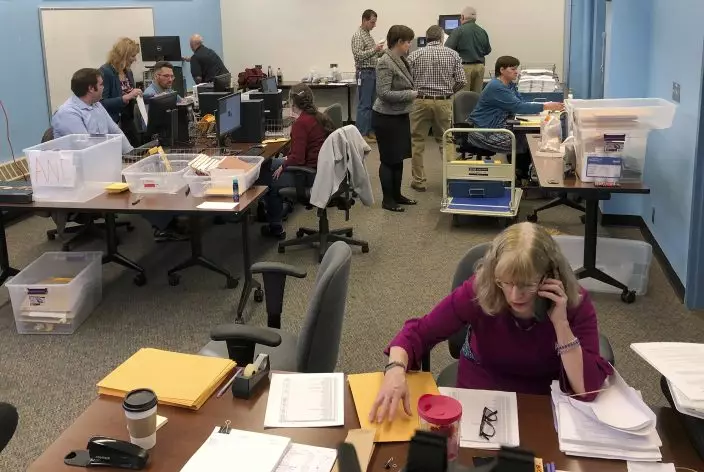
Maine election officials, including Democratic Deputy Secretary of State Julie Flynn, right, began counting ballots on Friday, Nov. 9, 2018, in Augusta for the Second Congressional District's House election. The election is the first congressional race in American history to be decided by the ranked-choice voting method that allows second choices. (AP PhotoMarina Villeneuve)
Under the system, a candidate wins with a majority of first-place votes. If there's no majority, the last-place candidate's second-place votes are reallocated to remaining candidates. The computerized process can be repeated until there's a winner.
Across the country, voting reform advocates are watching as the system faces its biggest test in the most expensive race in Maine history.
"This will either fuel the adoption of ranked-choice voting in other jurisdictions, or it will stop it in its tracks," said Corey Cook, dean of the School of Public Service at Boise State University, who has studied 100 elections that used the system.
Maine residents approved the system in 2016 after nine of the previous 11 gubernatorial elections resulted in winners who failed to get a majority of the vote.
Proponents say the system allows people to vote for third-party or independent candidates without concern for political "spoilers" or vote-splitting. They say it also moderates campaigns because candidates don't want to alienate supporters of other candidates in the event they need second-place votes to reach a majority.
Critics say the ballot and system can be confusing to voters. They also say bland campaigns don't allow candidates to differentiate themselves.
The system is sometimes referred to as an "instant runoff" in the dozen or so municipalities where it's used. But there's nothing instant about the process in Maine. All of the ballots, more than 600,000 of them, had to be shipped to Augusta and scanned into a computer. That process continued over the weekend.
In Maine, Poliquin had an edge Tuesday night of about 2,000 first-round votes over Golden but fell far short of reaching the 50 percent threshold. That means the outcome will hinge upon second-choice votes from more than 20,000 supporters of two independents who together collected about 8 percent of the vote.
If it works as intended, then it's possible the Republican incumbent with the most first-place votes could end up losing to a Democrat.
Some expect a lawsuit to challenge the one-person, one-vote rule under the theory that the system lets the supporter of a last-place candidate to effectively vote twice, violating the Equal Protection Clause.
The Maine GOP and Poliquin already have complained about unlocked ballot boxes and other irregularities, furthering speculation of a legal challenge. Poliquin has declined to say if he'll sue if he loses the ranked-choice election. Golden also declined to comment on the voting process.
Rob Richie, of FairVote, an organization that's pressing for ranked voting nationwide, dismissed murmurs of possible lawsuits as "sore loser talk."
Several courts, including the 9th Circuit Court of Appeals in San Francisco, have upheld the constitutionality of ranked-choice voting, he said.
Even though legal precedents favor ranked-choice voting in federal elections in Maine, a lawsuit is certainly possible given the high stakes, said James Monteleone, attorney for the Committee for Ranked Choice Voting in Maine.
"When political candidates find themselves in a difficult situation, creative lawyers come up with creative ideas," he said.
If there is a lawsuit, it would likely be in federal court in Maine, said Jim Burke, a professor from the University of Maine School of Law.
For now, the voting system is used only in federal races and in statewide primary elections in Maine. It cannot be used in the governor's race or legislative races because of concerns it runs afoul of the Maine Constitution.
Democratic Gov.-elect Janet Mills said she intends to press for an amendment to the Maine Constitution so the system can be used in all elections. That would require a two-thirds vote of the Maine Legislature and another statewide vote.
VENICE, Italy (AP) — Under the gaze of the world’s media, the fragile lagoon city of Venice launched a pilot program Thursday to charge day-trippers a 5-euro ($5.35) entry fee that authorities hope will discourage visitors from arriving on peak days and make the city more livable for its dwindling residents.
Visitors arriving at Venice's main train station were greeted with large signs listing the 29 dates through July of the plan's test phase that also designated separate entrances for tourists, and residents, students and workers.
“We need to find a new balance between the tourists and residents,’’ said Simone Venturini, the city’s top tourism official. “We need to safeguard the spaces of the residents, of course, and we need to discourage the arrival of day-trippers on some particular days.”
Not all residents, however, are persuaded of the efficacy of the new system in dissuading mass tourism, insisting that only a resurgence in the population will restore balance to a city where narrow alleyways and water buses are often clogged with tourists.
Hundreds of Venetians protested against the program, marching festively though the city's main bus terminal behind banners reading “No to Tickets, Yes to Services and Housing.” Protesters scuffled briefly with police with riot gear who blocked them from entering the city, before changing course and entering over another bridge escorted by plainclothes police officers. The demonstration wrapped up peacefully in a piazza.
Tourists arriving at the main station encountered almost as many journalists as stewards on hand to politely guide anyone unaware of the new requirements through the process of downloading the QR code to pay the fee.
Arianna Cecilia, a tourist from Rome visiting Venice for the first time, said she thought it was “strange” to have to pay to enter a city in her native country, and be funneled through separate entrance ways for tourists. She and her boyfriend were staying in nearby Treviso, and so downloaded the QR code as required. But she was still caught off-guard while soaking in her first view ever of Venice's canals by the sight of the entrance signs and her boyfriend telling her to get out the ticket.
On the other side of the entrance ways, workers in yellow vests carried out random checks at the train station. Transgressors face fines of 50 to 300 euros ($53 to $320), but officials said “common sense” was being applied for the launch.
The requirement applies only for people arriving between 8:30 a.m. and 4 p.m. Outside of those hours, access is free and unchecked.
Venice has long suffered under the pressure of overtourism, and officials hope that the pilot project can help provide more exact figures to better manage the phenomenon.
The city can track the number of hotel visitors, which last year numbered 4.6 million and is down 16% from pre-pandemic highs. But the number of day visitors, which make up the majority of the crowds in Venice, could only be estimated until recently.
A Smart Control Room set up during the pandemic has been tracking arrivals from cellphone data, roughly confirming pre-pandemic estimates of 25 million to 30 million arrivals a year, said Michele Zuin, the city’s top economic official. That includes both day-trippers and overnight guests.
But Zuin said the data is incomplete.
“It’s clear we will get more reliable data from the contribution” being paid by day-trippers, he said.
Venturini said the city is strained when the number of day-trippers reaches 30,000 to 40,000. On peak days, local police set up one-way traffic for pedestrians to keep the crowds moving.
Residents opposing the day-tripper tax insist that the solution to Venice's woes are to boost the resident population and the services they need, limiting short-term rentals to make available more housing and attract families back from the mainland.
Last year, Venice passed a telling milestone when the number of tourist beds exceeded for the first time the number of official residents, which is now below 50,000 in the historic center with its picturesque canals.
“Putting a ticket to enter a city will not decrease not even by one single unit the number of visitors that are coming,’’ said Tommaso Cacciari, an activist who organized a protest Thursday against the measure.
“You pay a ticket to take the metro, to go to a museum, an amusement park. You don’t pay a ticket to enter a city. This is the last symbolic step of a project of an idea of this municipal administration to kick residents out of Venice,” he said.
Venice Mayor Luigi Brugnaro declared the launch day, coinciding with an Italian holiday, a success, registering 15,700 paying visitors, 50% more than anticipated.
More than 97,000 others had downloaded a QR code denoting an exemption, including to work in Venice or as a resident of the Veneto region. Hotels in Venice, including in mainland districts like Marghera or Mestre, provided a QR code for visitors to attest to their stay, which includes a hotel tax — accounting for 40,000 of those.
Venturini, the tourist official, said that interest in Venice’s pilot program has been keen from other places suffering from mass tourism, including other Italian art cities, and municipalities abroad such as Barcelona, Spain, and Amsterdam.
But Marina Rodino, who has lived in Venice for 30 years, doesn't see the fee as the cure-all. Neighboring apartments in her residential building near the famed Rialto Bridge once inhabited by families are now short-term apartment rentals.
The corner butcher shop closed. Yet she noted that the new entrance fee requirement will still allow young people to flood the city in the evening for the traditional aperitivo, which can grow rowdy.
She was passing out mock European Union passports for “Venice, Open City,” underlining the irony of the new system, and challenging its legal standing with citations from the Italian Constitution guaranteeing its citizens the right to “move or reside freely in any part of the national territory."
“This is not a natural oasis. This is not a museum. It is not Pompeii. It is a city, where we need to fight so the houses are inhabited by families, and stores reopen. That is what would counter this wild tourism,’’ Rodino said.
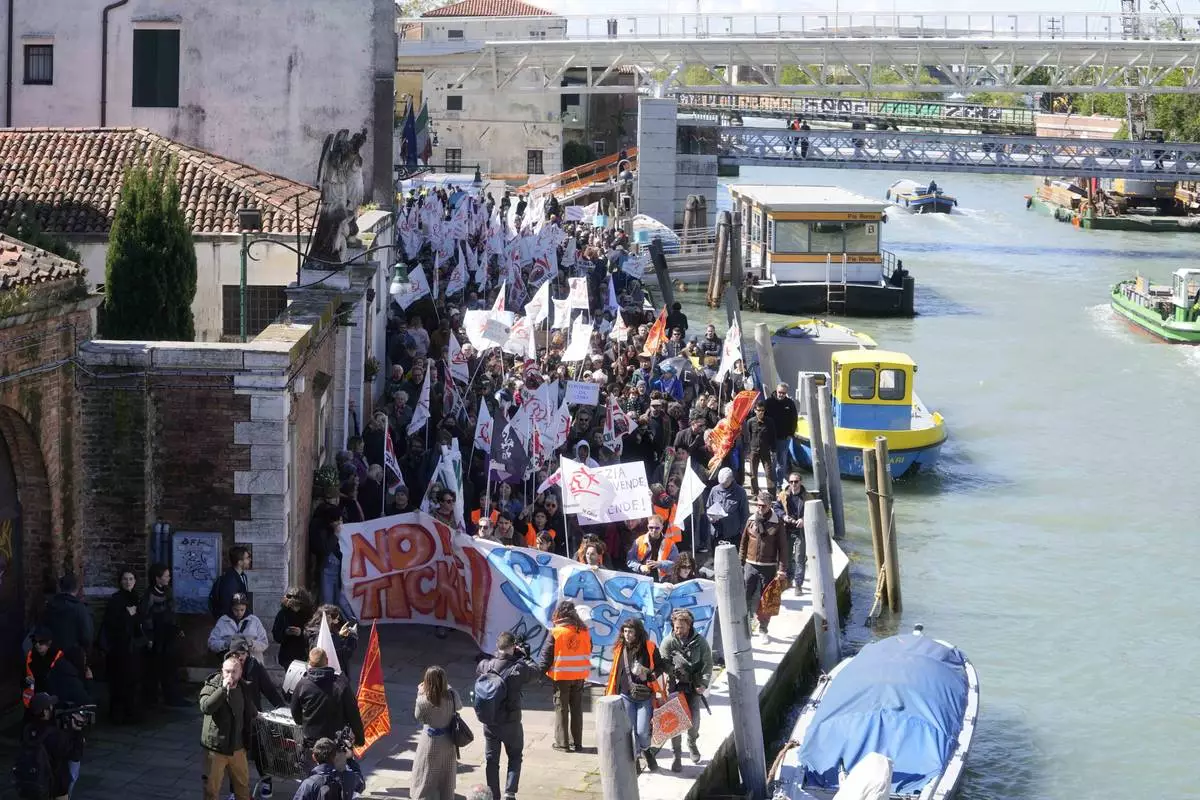
Citizens and activists stage a protest against Venice Tax Fee in Venice, Italy, Thursday, April 25, 2024. The fragile lagoon city of Venice begins a pilot program Thursday to charge daytrippers a 5 euro entry fee that authorities hope will discourage tourists from arriving on peak days. The daytripper tax is being tested on 29 days through July, mostly weekends and holidays starting with Italy's Liberation Day holiday Thursday. Officials expect some 10,000 people will pay the fee to access the city on the first day, downloading a QR code to prove their payment, while another 70,000 will receive exceptions, for example, because they work in Venice or live in the Veneto region. (AP Photo/Luca Bruno)

A citizen shows a ticket with the writing 'Veniceland' during a protest against Venice Tax Fee in Venice, Italy, Thursday, April 25, 2024. The fragile lagoon city of Venice begins a pilot program Thursday to charge daytrippers a 5 euro entry fee that authorities hope will discourage tourists from arriving on peak days. The daytripper tax is being tested on 29 days through July, mostly weekends and holidays starting with Italy's Liberation Day holiday Thursday. Officials expect some 10,000 people will pay the fee to access the city on the first day, downloading a QR code to prove their payment, while another 70,000 will receive exceptions, for example, because they work in Venice or live in the Veneto region. (AP Photo/Luca Bruno)
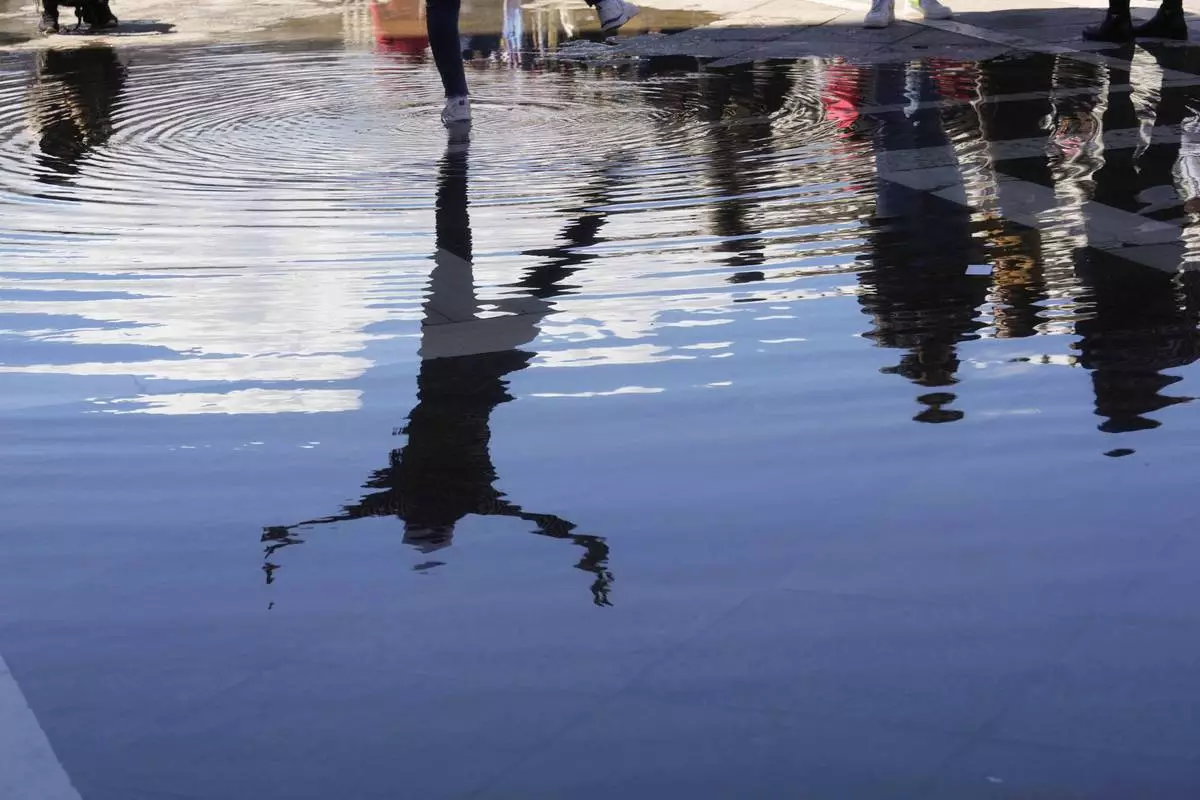
Tourists enjoy a sunny day at St.Mark square in Venice, Italy, Thursday, April 25, 2024. The fragile lagoon city of Venice begins a pilot program Thursday to charge daytrippers a 5 euro entry fee that authorities hope will discourage tourists from arriving on peak days. (AP Photo/Luca Bruno)
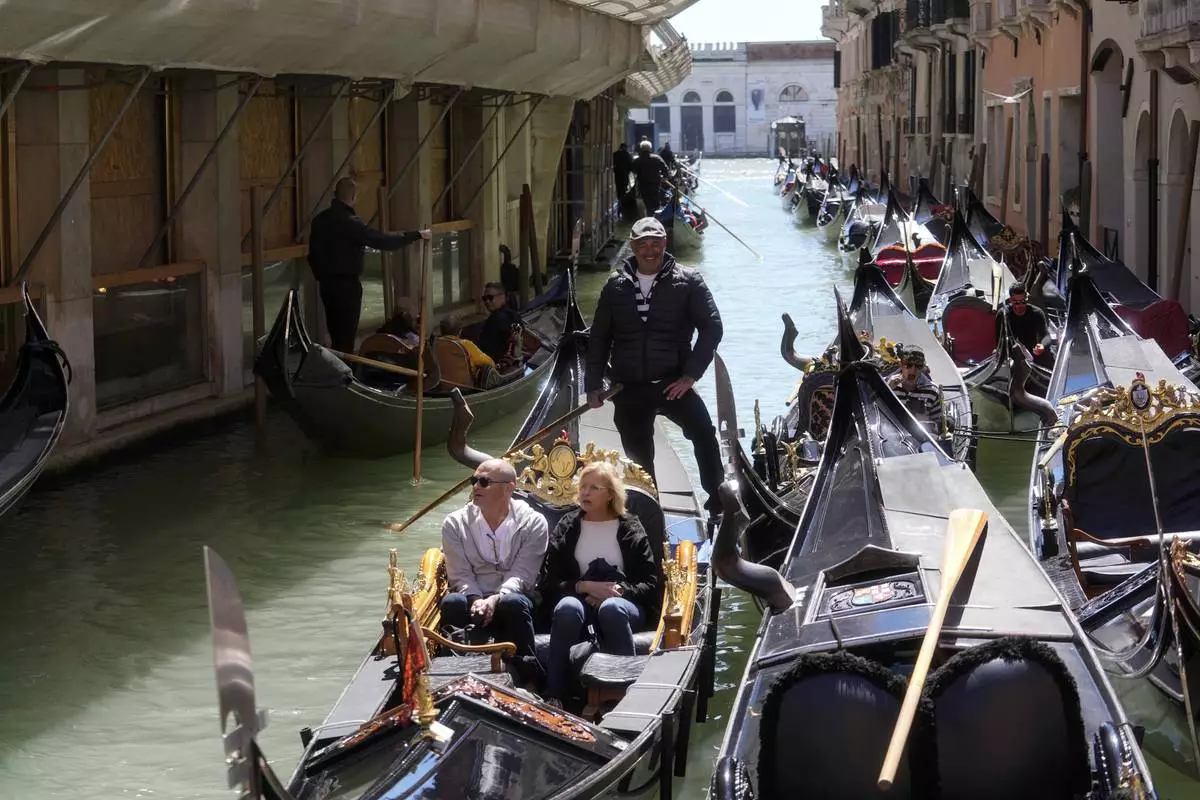
Tourists enjoy a ride on gondolas in Venice, Italy, Thursday, April 25, 2024. The fragile lagoon city of Venice begins a pilot program Thursday to charge daytrippers a 5 euro entry fee that authorities hope will discourage tourists from arriving on peak days. (AP Photo/Luca Bruno)

Citizens and activists confront police during a demonstration against Venice Tax Fee in Venice, Italy, Thursday, April 25, 2024. The fragile lagoon city of Venice begins a pilot program Thursday to charge daytrippers a 5 euro entry fee that authorities hope will discourage tourists from arriving on peak days. The daytripper tax is being tested on 29 days through July, mostly weekends and holidays starting with Italy's Liberation Day holiday Thursday. Officials expect some 10,000 people will pay the fee to access the city on the first day, downloading a QR code to prove their payment, while another 70,000 will receive exceptions, for example, because they work in Venice or live in the Veneto region. (AP Photo/Luca Bruno)
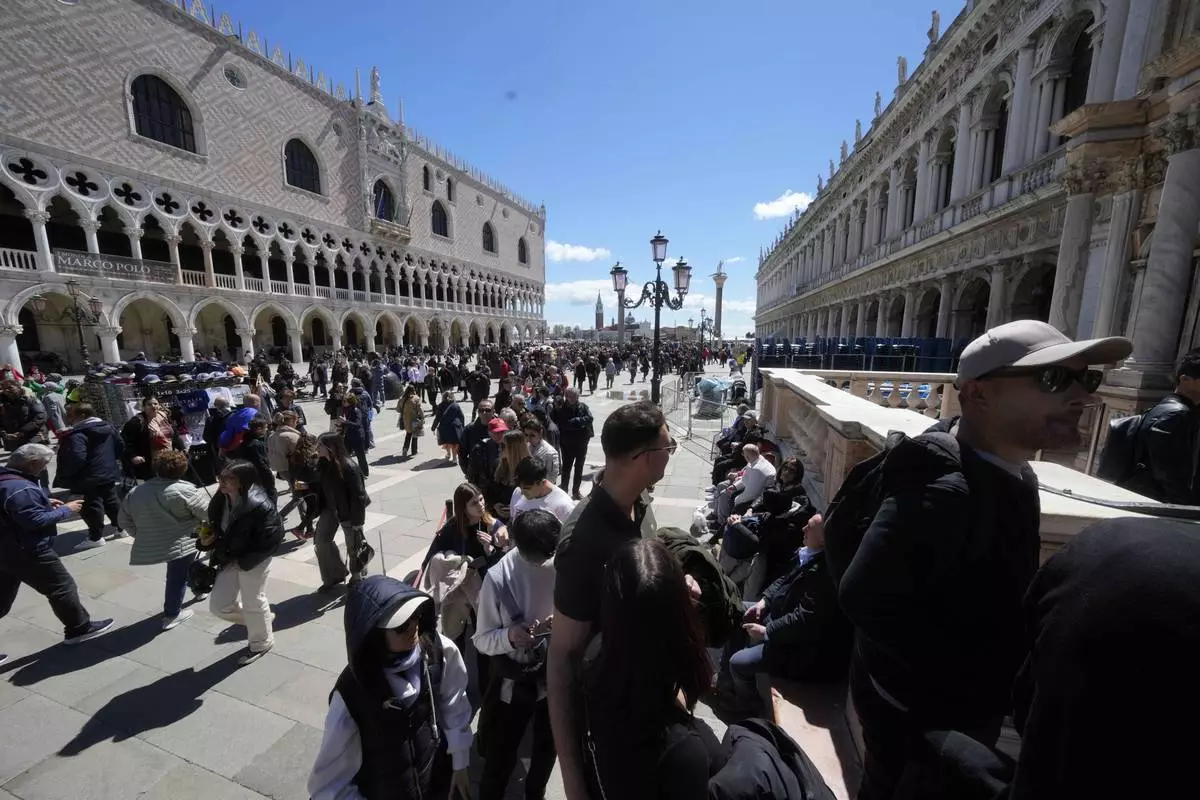
Tourists line up to enter at the at St.Mark bell tower in Venice, Italy, Thursday, April 25, 2024. The fragile lagoon city of Venice begins a pilot program Thursday to charge daytrippers a 5 euro entry fee that authorities hope will discourage tourists from arriving on peak days. (AP Photo/Luca Bruno)
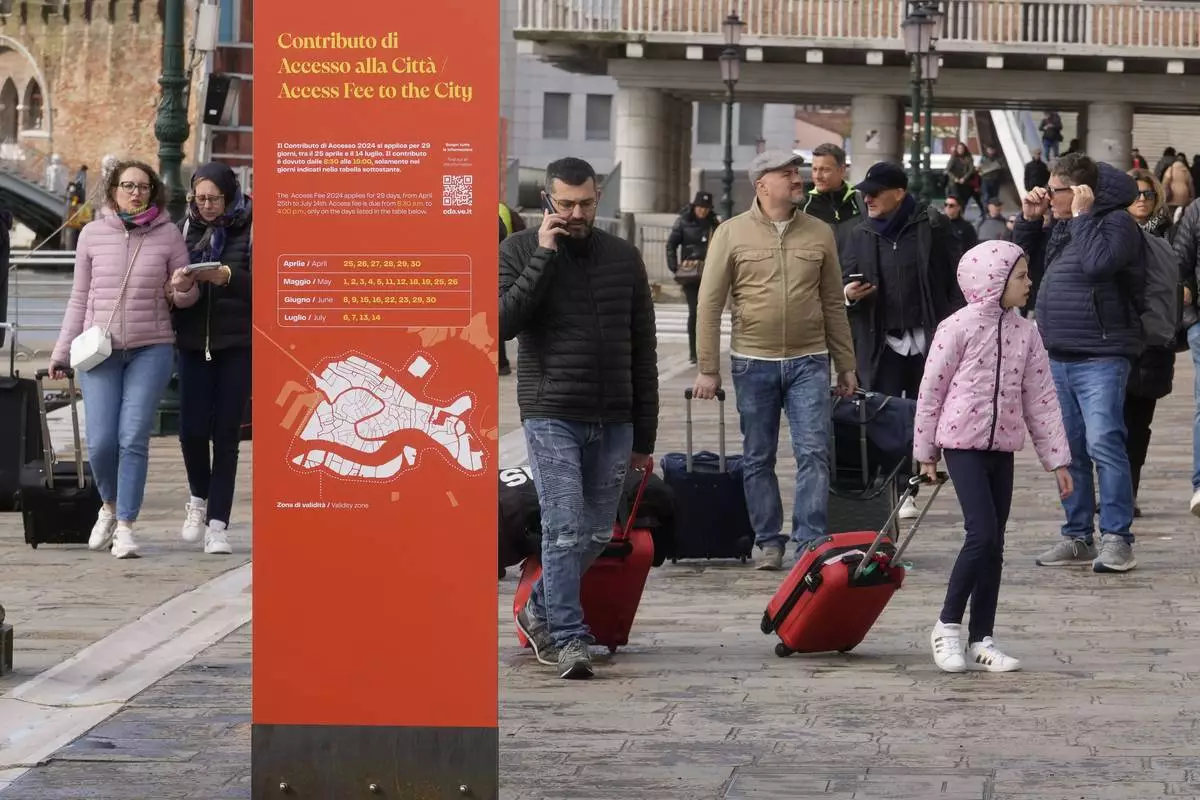
Tourists arrive in Venice, Italy, Thursday, April 25, 2024. The fragile lagoon city of Venice begins a pilot program Thursday to charge daytrippers a 5 euro entry fee that authorities hope will discourage tourists from arriving on peak days. The daytripper tax is being tested on 29 days through July, mostly weekends and holidays starting with Italy's Liberation Day holiday Thursday. Officials expect some 10,000 people will pay the fee to access the city on the first day, downloading a QR code to prove their payment, while another 70,000 will receive exceptions, for example, because they work in Venice or live in the Veneto region. (AP Photo/Luca Bruno)
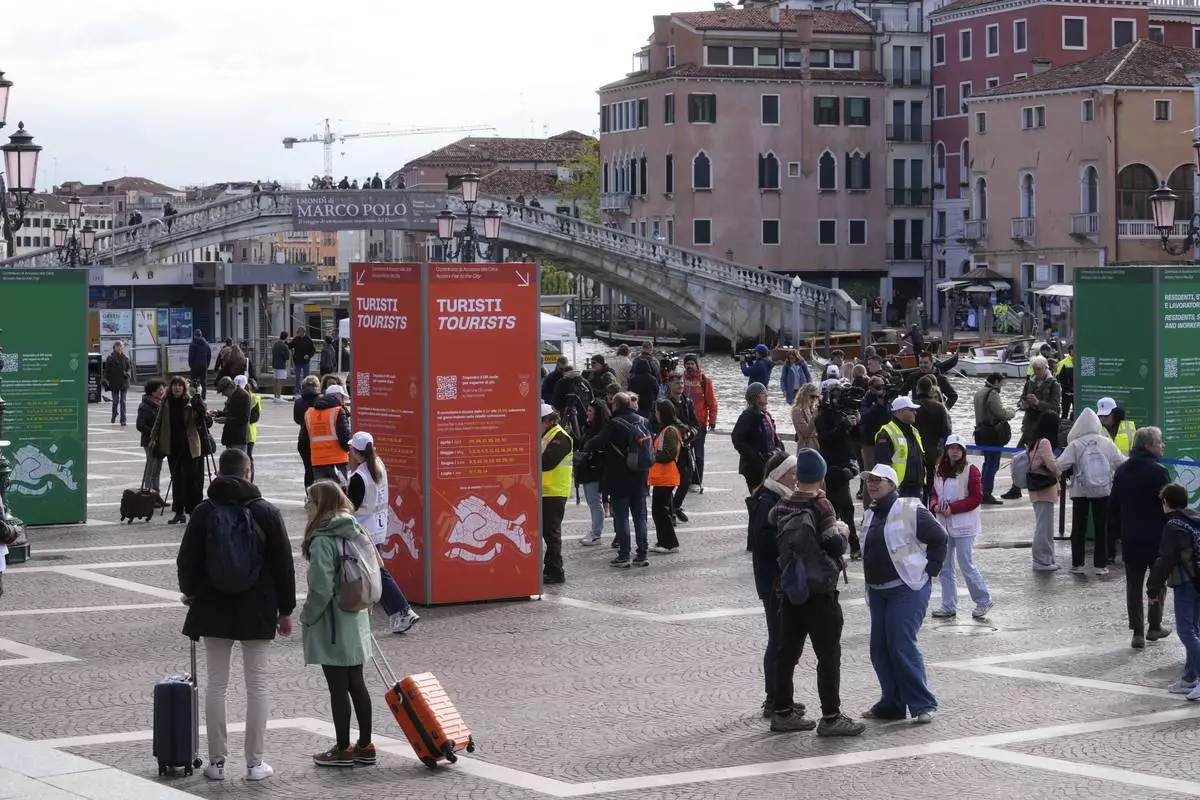
Stewards check tourists QR code access outside the main train station in Venice, Italy, Thursday, April 25, 2024. The fragile lagoon city of Venice begins a pilot program Thursday to charge daytrippers a 5 euro entry fee that authorities hope will discourage tourists from arriving on peak days. The daytripper tax is being tested on 29 days through July, mostly weekends and holidays starting with Italy's Liberation Day holiday Thursday. Officials expect some 10,000 people will pay the fee to access the city on the first day, downloading a QR code to prove their payment, while another 70,000 will receive exceptions, for example, because they work in Venice or live in the Veneto region. (AP Photo/Luca Bruno)
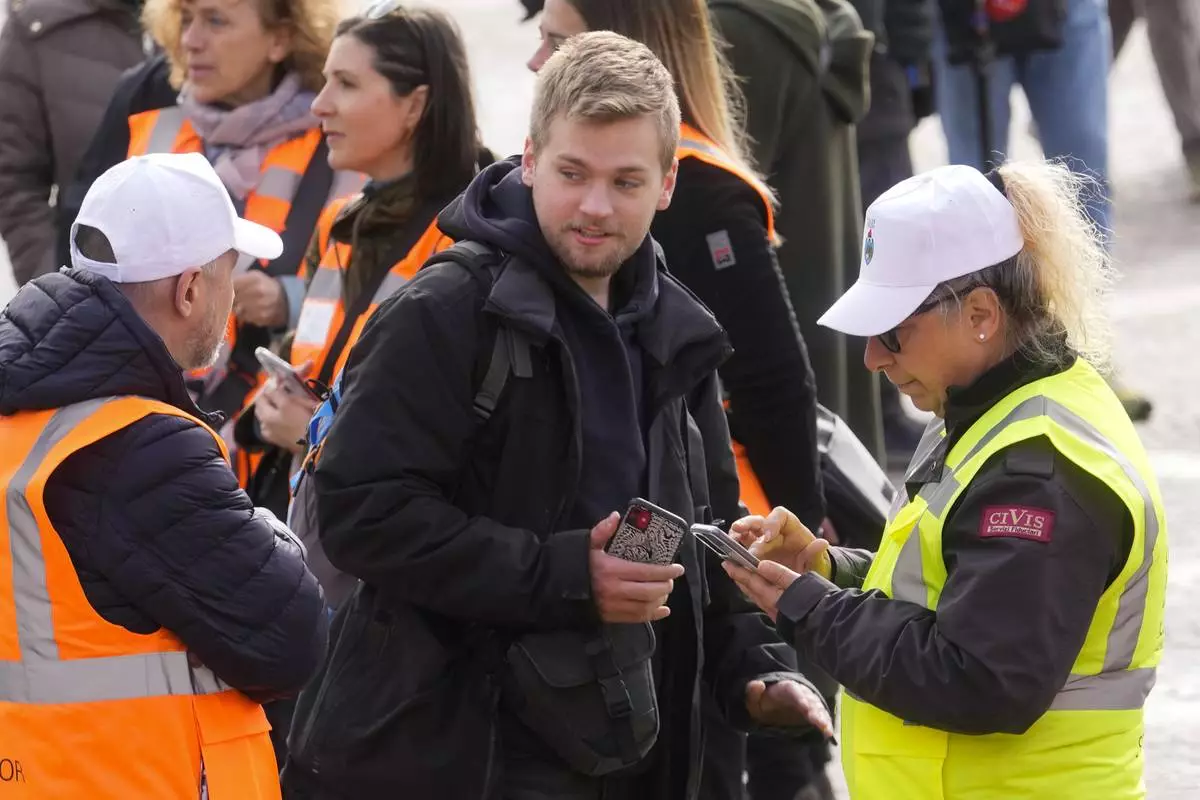
Stewards check a tourist QR code access outside the main train station in Venice, Italy, Thursday, April 25, 2024. The fragile lagoon city of Venice begins a pilot program Thursday to charge daytrippers a 5 euro entry fee that authorities hope will discourage tourists from arriving on peak days. The daytripper tax is being tested on 29 days through July, mostly weekends and holidays starting with Italy's Liberation Day holiday Thursday. Officials expect some 10,000 people will pay the fee to access the city on the first day, downloading a QR code to prove their payment, while another 70,000 will receive exceptions, for example, because they work in Venice or live in the Veneto region. (AP Photo/Luca Bruno)
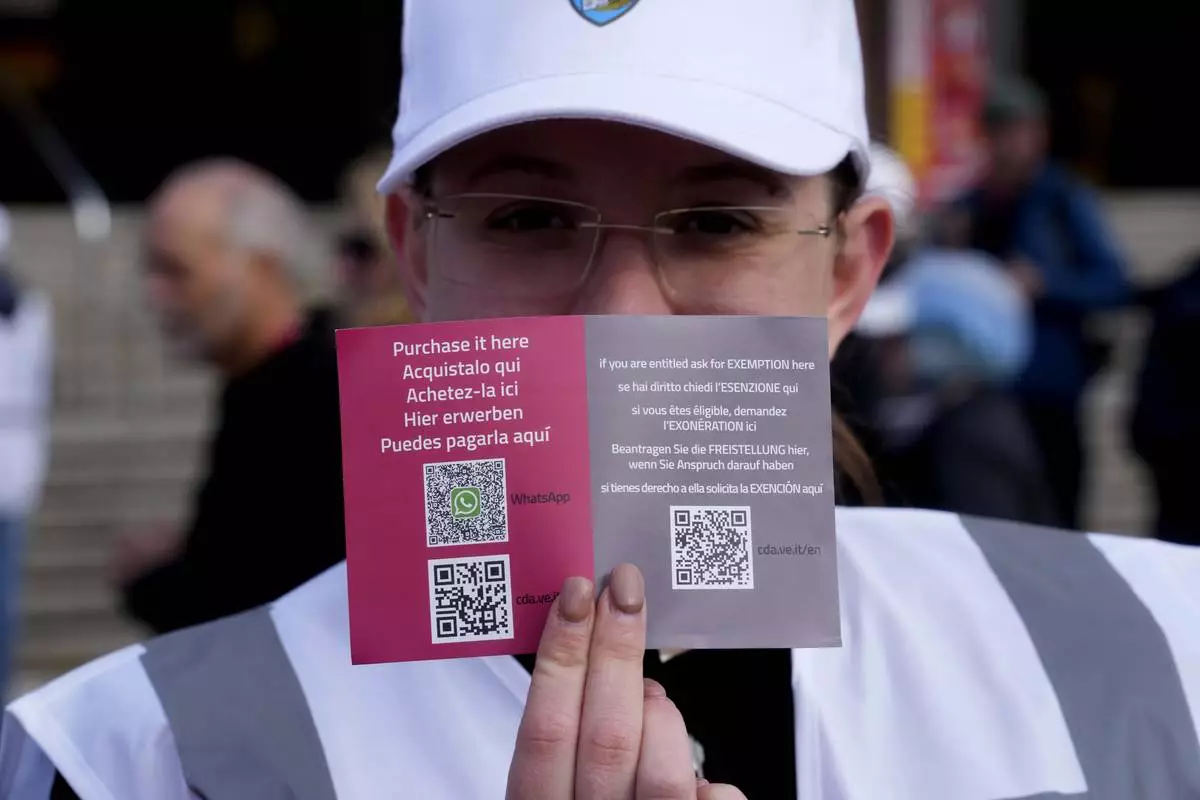
A steward shows the QR code access outside the main train station in Venice, Italy, Thursday, April 25, 2024. The fragile lagoon city of Venice begins a pilot program Thursday to charge daytrippers a 5 euro entry fee that authorities hope will discourage tourists from arriving on peak days. The daytripper tax is being tested on 29 days through July, mostly weekends and holidays starting with Italy's Liberation Day holiday Thursday. Officials expect some 10,000 people will pay the fee to access the city on the first day, downloading a QR code to prove their payment, while another 70,000 will receive exceptions, for example, because they work in Venice or live in the Veneto region. (AP Photo/Luca Bruno)
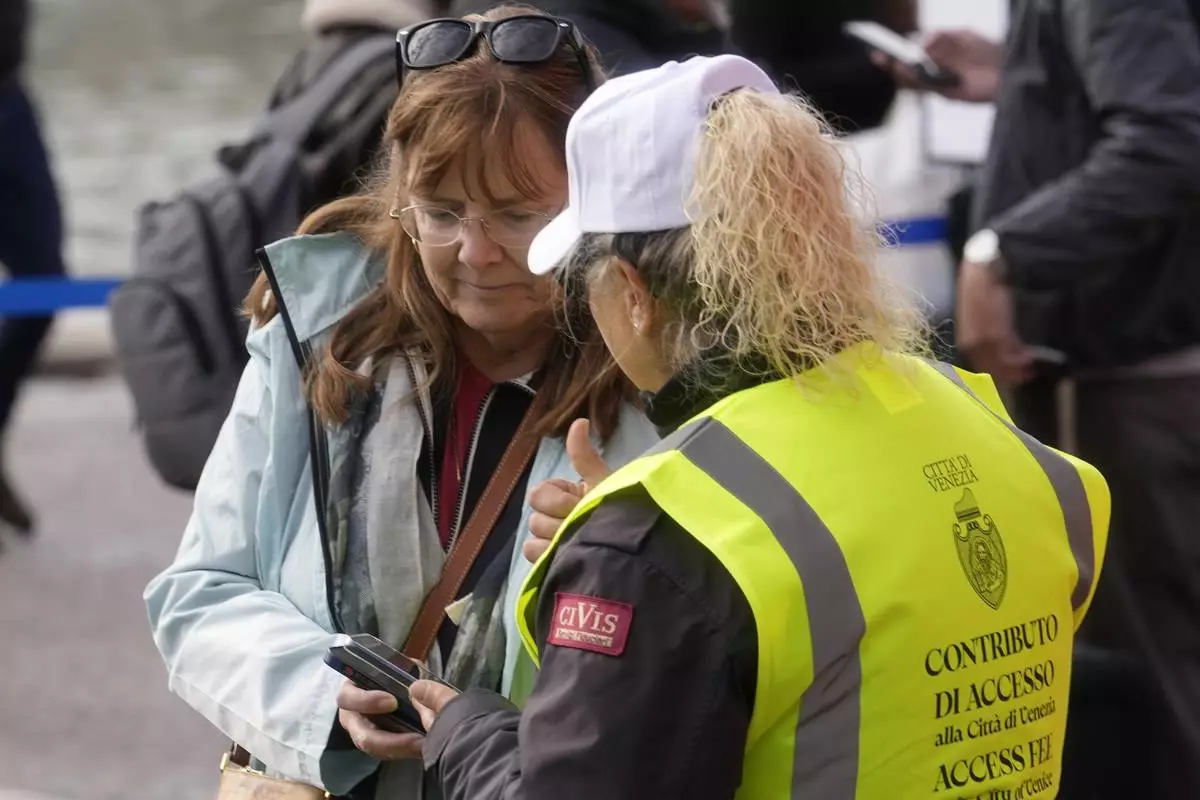
A steward checks a tourist QR code access outside the main train station in Venice, Italy, Thursday, April 25, 2024. The fragile lagoon city of Venice begins a pilot program Thursday to charge daytrippers a 5 euro entry fee that authorities hope will discourage tourists from arriving on peak days. The daytripper tax is being tested on 29 days through July, mostly weekends and holidays starting with Italy's Liberation Day holiday Thursday. Officials expect some 10,000 people will pay the fee to access the city on the first day, downloading a QR code to prove their payment, while another 70,000 will receive exceptions, for example, because they work in Venice or live in the Veneto region. (AP Photo/Luca Bruno)
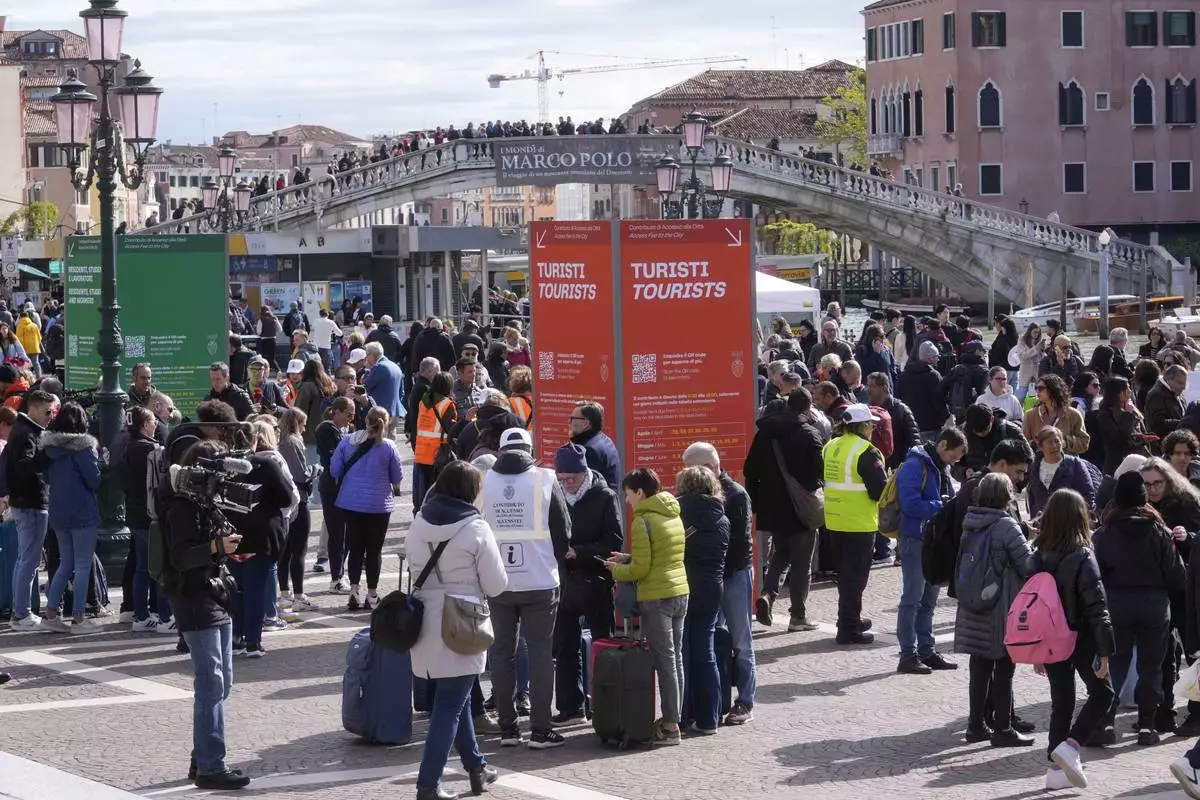
Stewards check tourists QR code access outside the main train station in Venice, Italy, Thursday, April 25, 2024. The fragile lagoon city of Venice begins a pilot program Thursday to charge daytrippers a 5 euro entry fee that authorities hope will discourage tourists from arriving on peak days. The daytripper tax is being tested on 29 days through July, mostly weekends and holidays starting with Italy's Liberation Day holiday Thursday. Officials expect some 10,000 people will pay the fee to access the city on the first day, downloading a QR code to prove their payment, while another 70,000 will receive exceptions, for example, because they work in Venice or live in the Veneto region. (AP Photo/Luca Bruno)
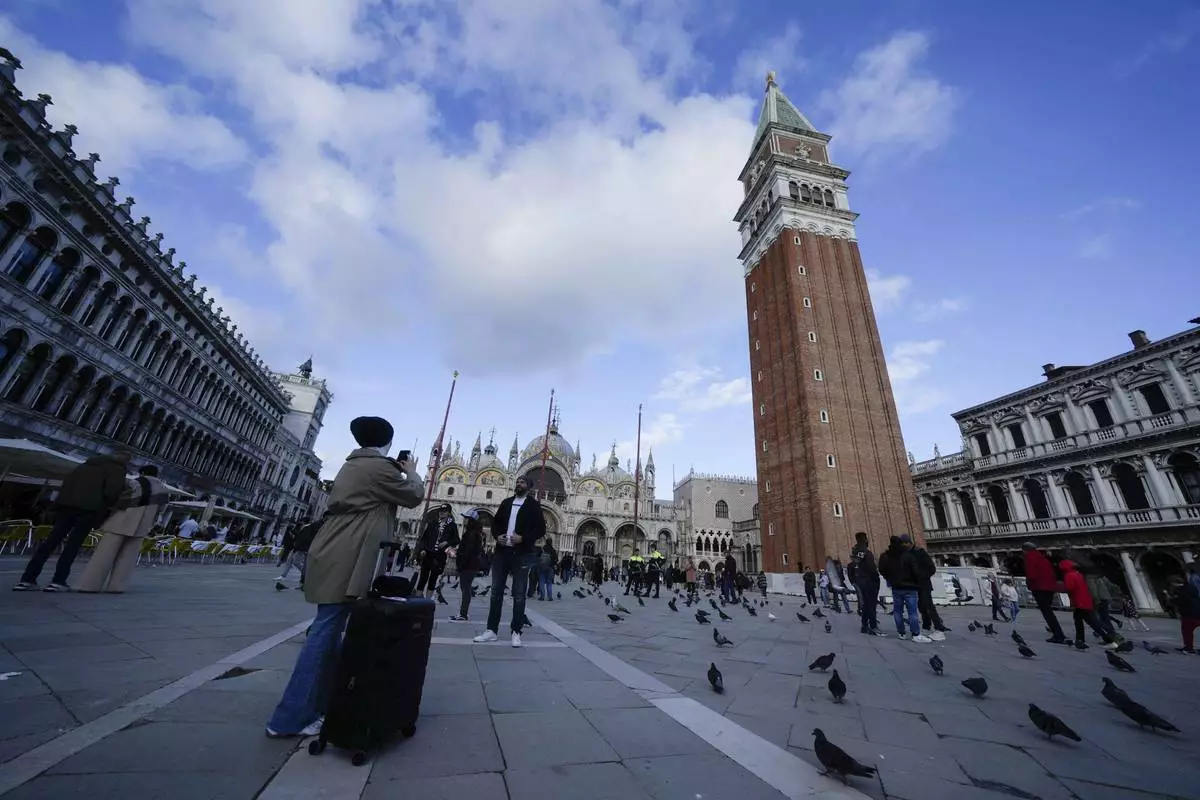
Tourists take pictures at the St. Mark square in Venice, Italy, Wednesday, April 24, 2024. The lagoon city of Venice begins a pilot program Thursday, April 25, 2024 to charge daytrippers a 5 euro entry fee that authorities hope will discourage tourists from arriving on peak days. Officials expect some 10,000 people will pay the fee to access the city on the first day, downloading a QR code to prove their payment. (AP Photo/Luca Bruno)
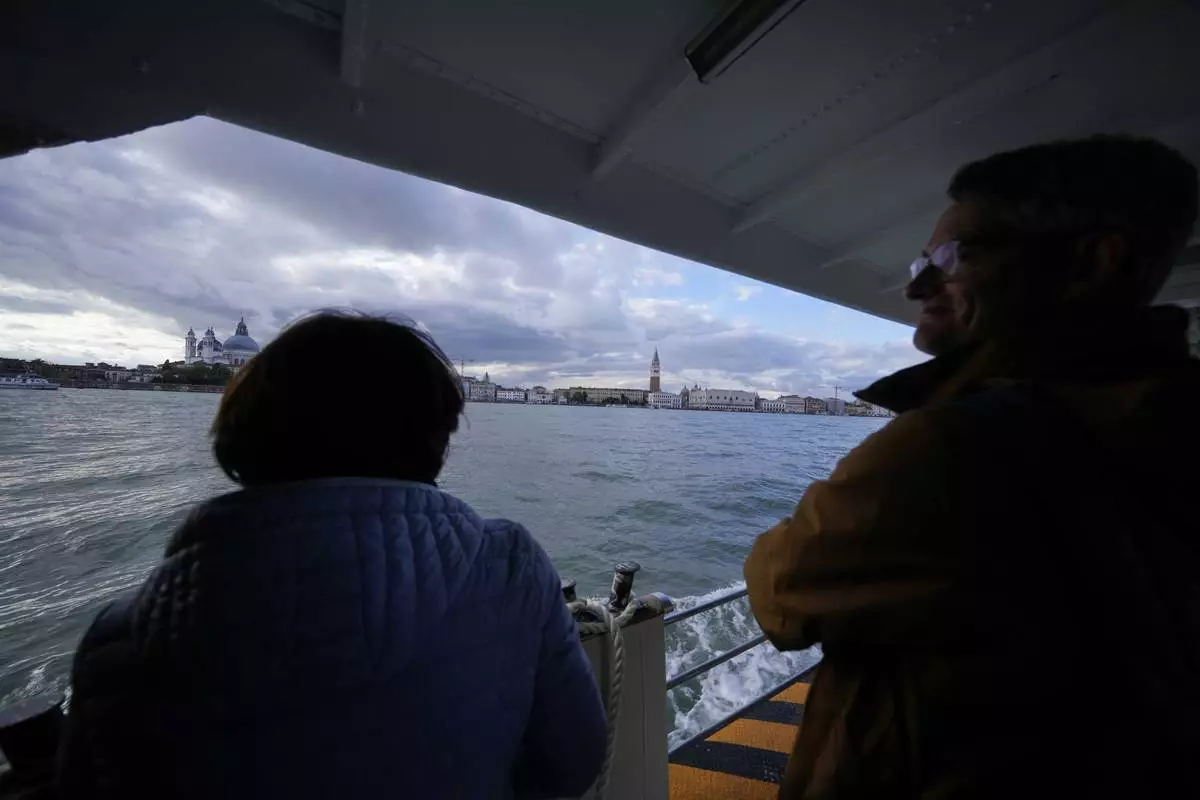
Tourists ride on a ferry boat in Venice, Italy, Wednesday, April 24, 2024. The lagoon city of Venice begins a pilot program Thursday, April 25, 2024 to charge daytrippers a 5 euro entry fee that authorities hope will discourage tourists from arriving on peak days. Officials expect some 10,000 people will pay the fee to access the city on the first day, downloading a QR code to prove their payment. (AP Photo/Luca Bruno)
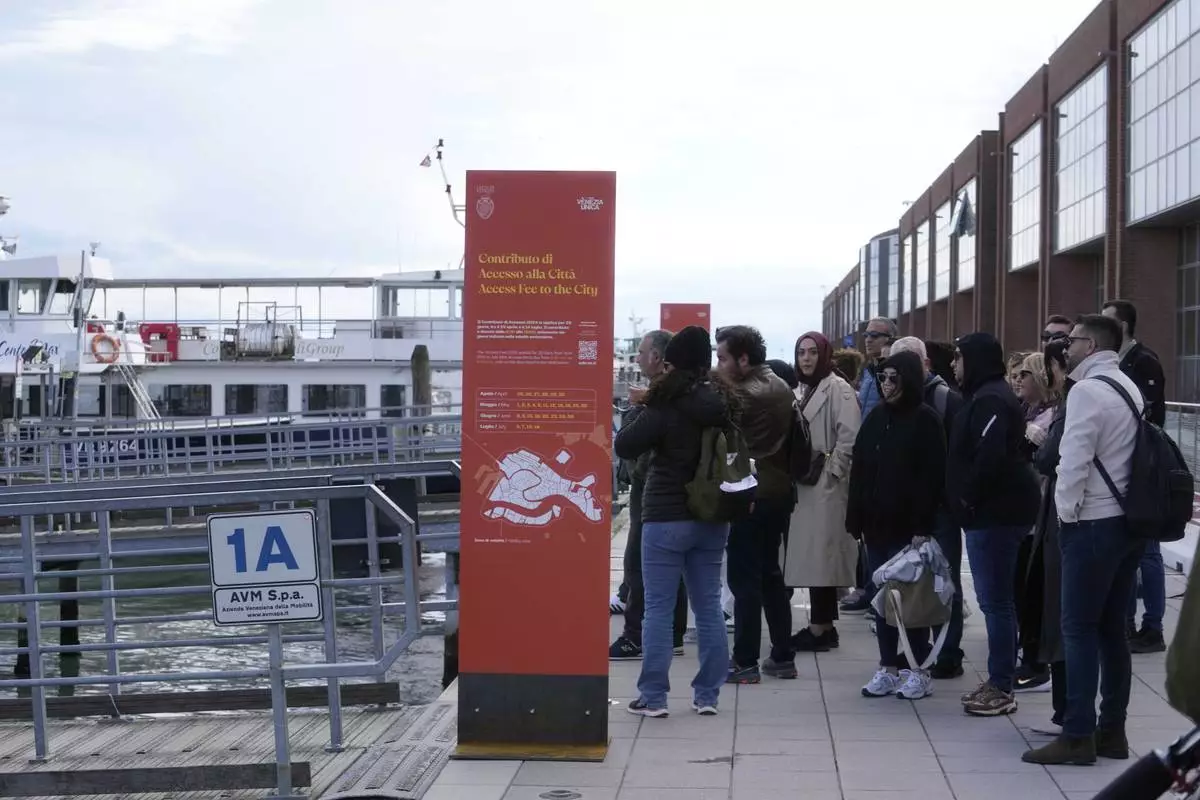
People stand in front of an information board explaining how to pay the tourist tax in Venice, Italy, Wednesday, April 24, 2024. The lagoon city of Venice begins a pilot program Thursday, April 25, 2024 to charge daytrippers a 5 euro entry fee that authorities hope will discourage tourists from arriving on peak days. Officials expect some 10,000 people will pay the fee to access the city on the first day, downloading a QR code to prove their payment. (AP Photo/Luca Bruno)
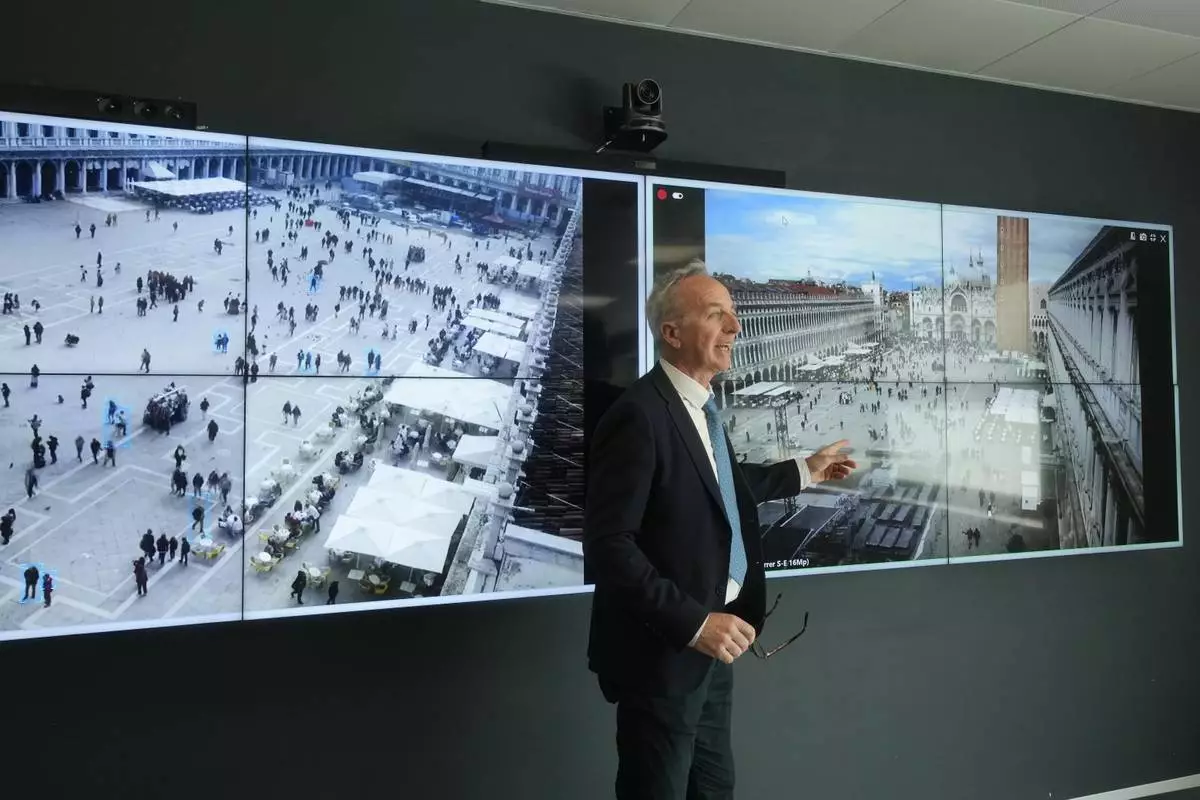
Marco Bettini, director of Venis Informatics System, gestures as he talks to reporters at the police Venice control room, in Venice, Italy, Wednesday, April 24, 2024. The lagoon city of Venice begins a pilot program Thursday, April 25, 2024 to charge daytrippers a 5 euro entry fee that authorities hope will discourage tourists from arriving on peak days. Officials expect some 10,000 people will pay the fee to access the city on the first day, downloading a QR code to prove their payment. (AP Photo/Luca Bruno)
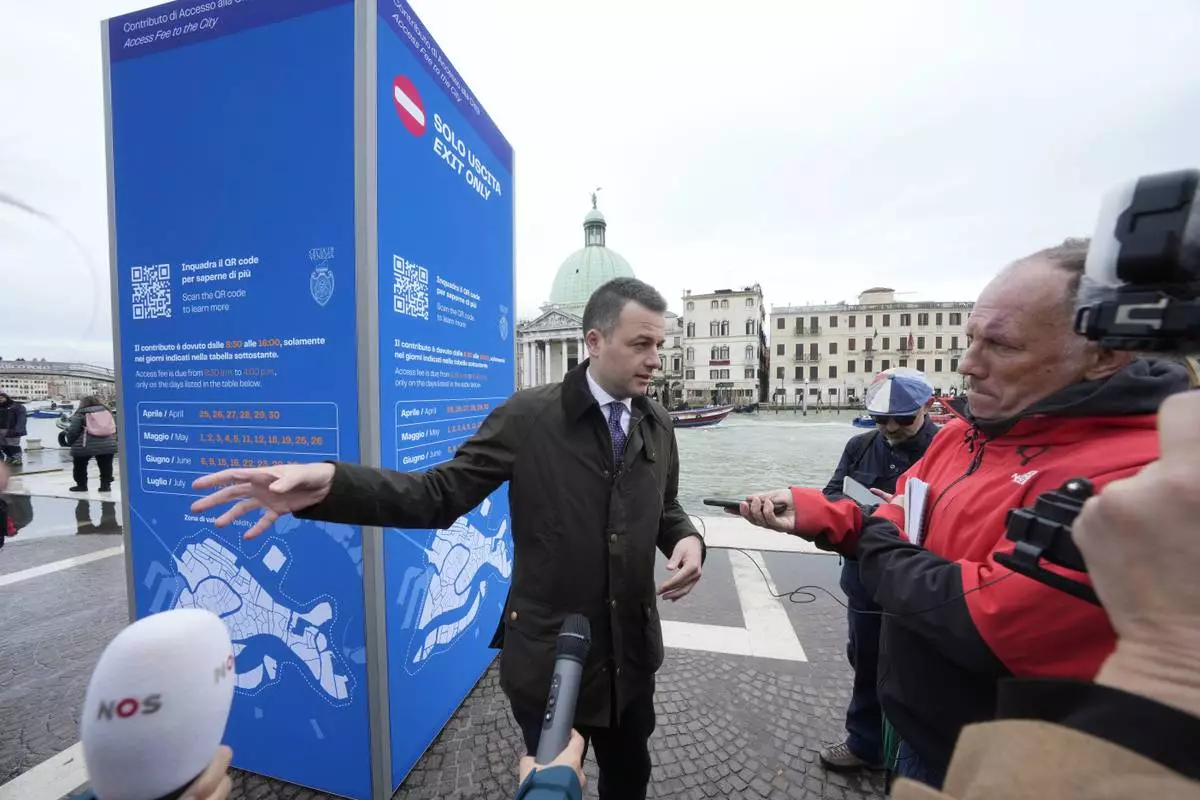
Venice councillor Simone Venturini speaks with reporters in front of a tourist tax totem in Venice, Italy, Wednesday, April 24, 2024. The lagoon city of Venice begins a pilot program Thursday, April 25, 2024 to charge daytrippers a 5 euro entry fee that authorities hope will discourage tourists from arriving on peak days. Officials expect some 10,000 people will pay the fee to access the city on the first day, downloading a QR code to prove their payment. (AP Photo/Luca Bruno)
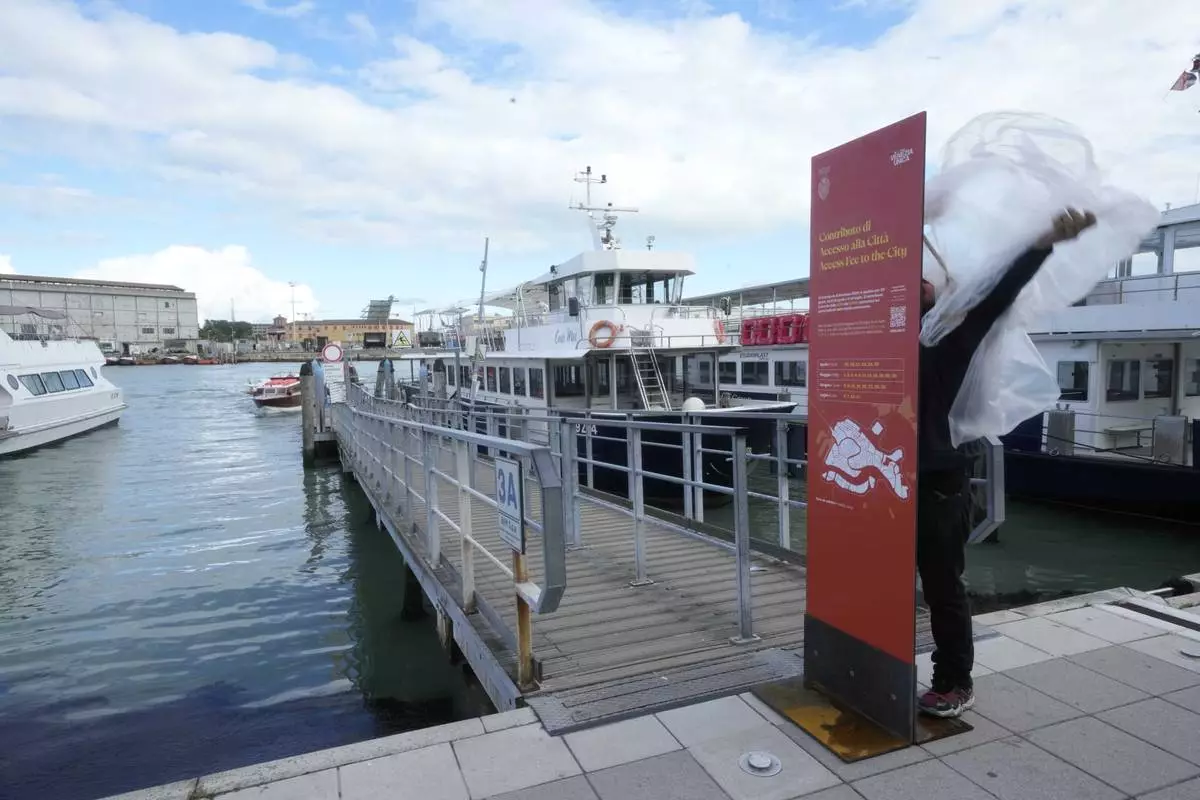
Workers prepare banner explaining how to pay the tourist tax in Venice, Italy, Wednesday, April 24, 2024. The lagoon city of Venice begins a pilot program Thursday, April 25, 2024 to charge daytrippers a 5 euro entry fee that authorities hope will discourage tourists from arriving on peak days. Officials expect some 10,000 people will pay the fee to access the city on the first day, downloading a QR code to prove their payment. (AP Photo/Luca Bruno)
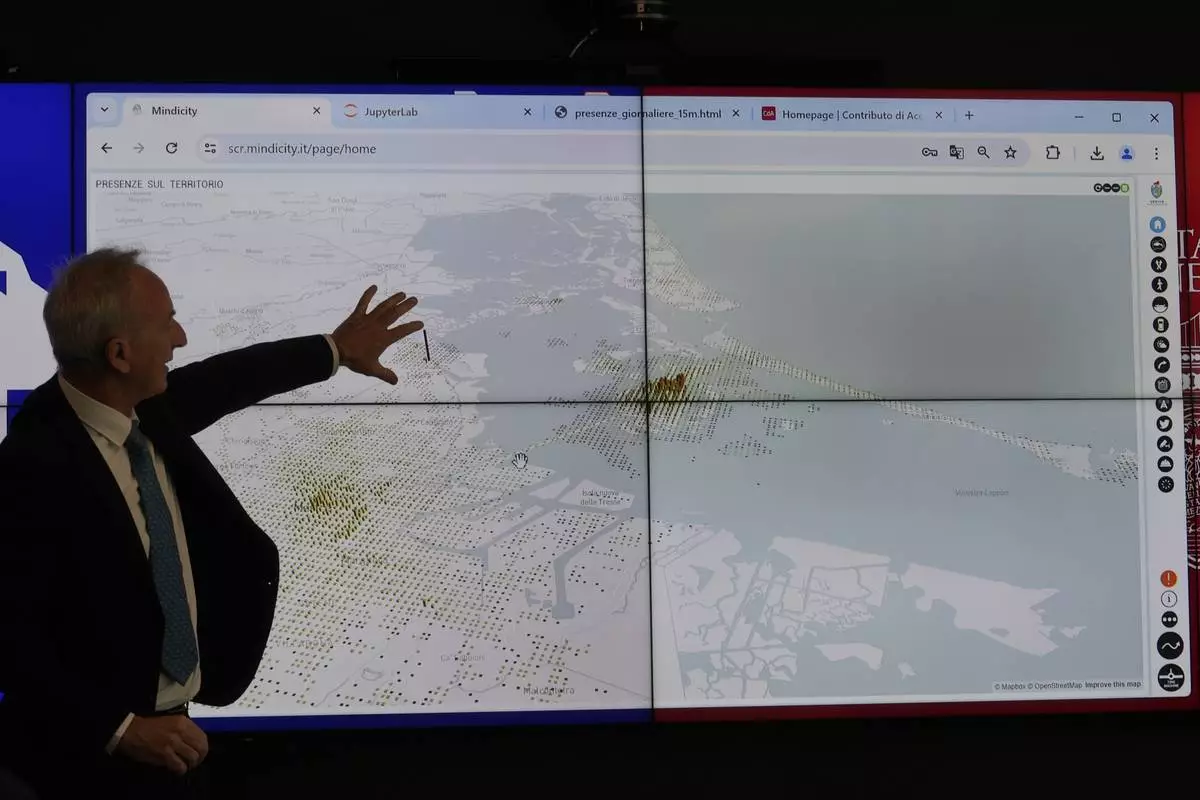
Marco Bettini, director of Venis Informatics System, gestures as he explains the Venice density to reporters at the police Venice control room in Venice, Italy, Wednesday, April 24, 2024. The lagoon city of Venice begins a pilot program Thursday, April 25, 2024 to charge daytrippers a 5 euro entry fee that authorities hope will discourage tourists from arriving on peak days. Officials expect some 10,000 people will pay the fee to access the city on the first day, downloading a QR code to prove their payment. (AP Photo/Luca Bruno)
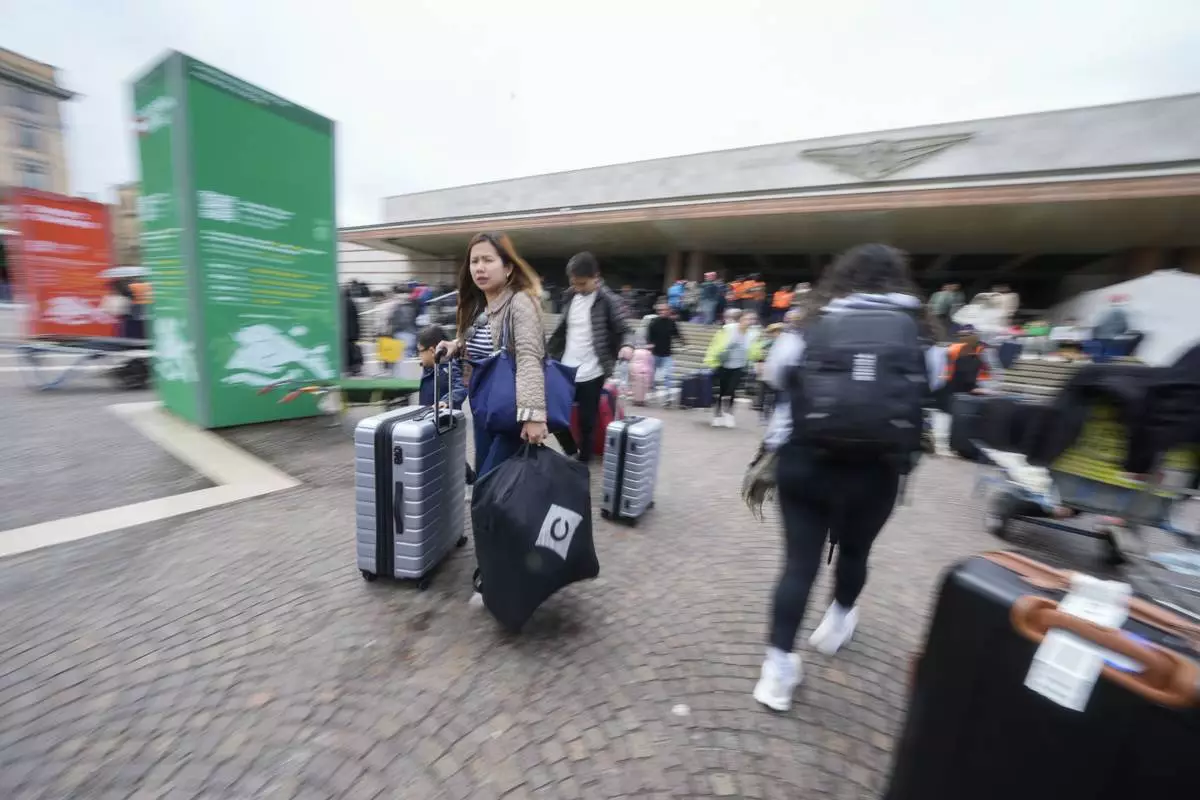
Tourists arrive at the main train station in Venice, Italy, Wednesday, April 24, 2024. The lagoon city of Venice begins a pilot program Thursday, April 25, 2024 to charge daytrippers a 5 euro entry fee that authorities hope will discourage tourists from arriving on peak days. Officials expect some 10,000 people will pay the fee to access the city on the first day, downloading a QR code to prove their payment. (AP Photo/Luca Bruno)
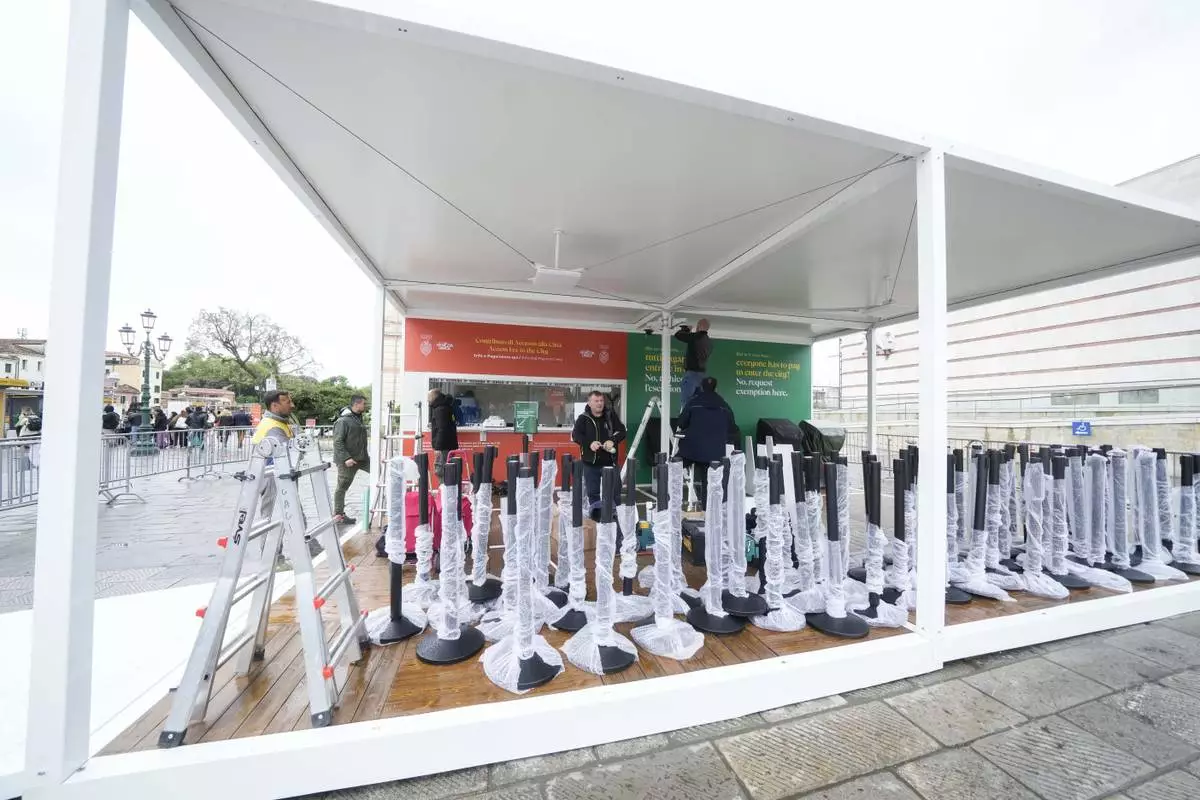
Workers prepare the tourist tax cashier desks outside the main train station in Venice, Italy, Wednesday, April 24, 2024. The lagoon city of Venice begins a pilot program Thursday, April 25, 2024 to charge daytrippers a 5 euro entry fee that authorities hope will discourage tourists from arriving on peak days. Officials expect some 10,000 people will pay the fee to access the city on the first day, downloading a QR code to prove their payment. (AP Photo/Luca Bruno)
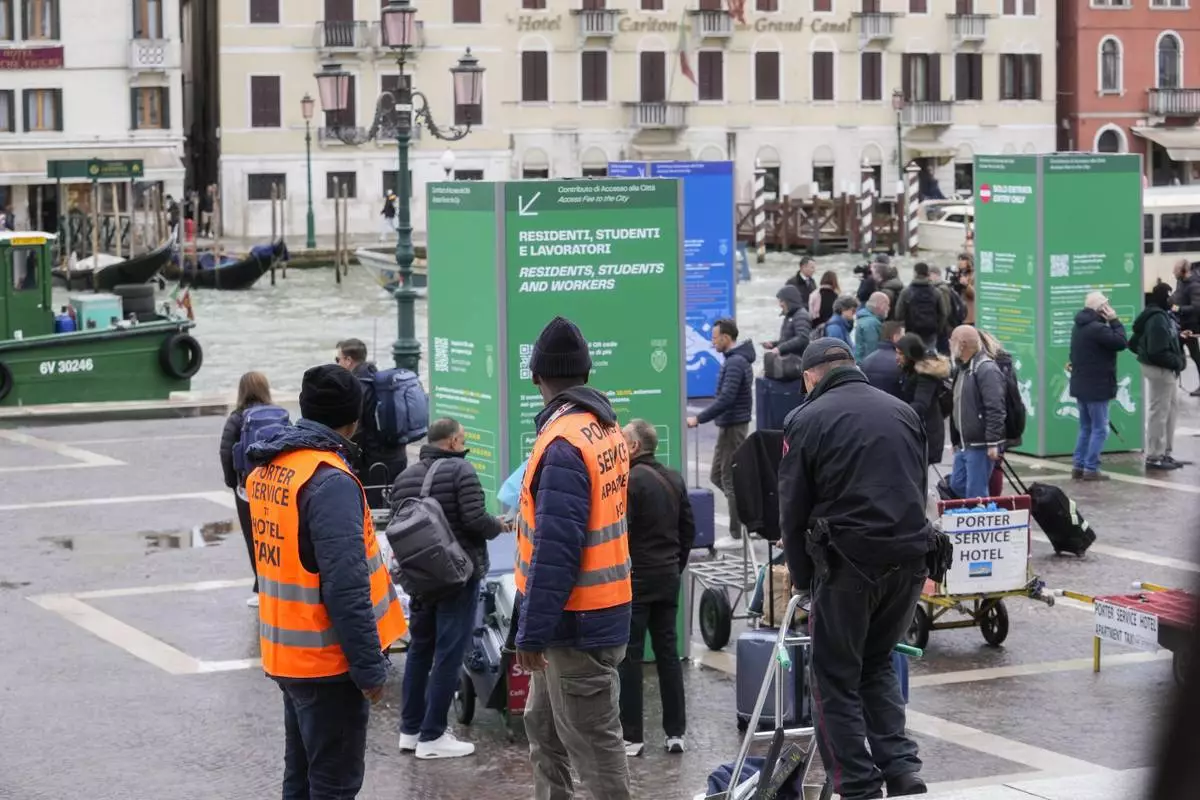
Porters wait for tourists outside the main train station in Venice, Italy, Wednesday, April 24, 2024. The lagoon city of Venice begins a pilot program Thursday, April 25, 2024 to charge daytrippers a 5 euro entry fee that authorities hope will discourage tourists from arriving on peak days. Officials expect some 10,000 people will pay the fee to access the city on the first day, downloading a QR code to prove their payment. (AP Photo/Luca Bruno)
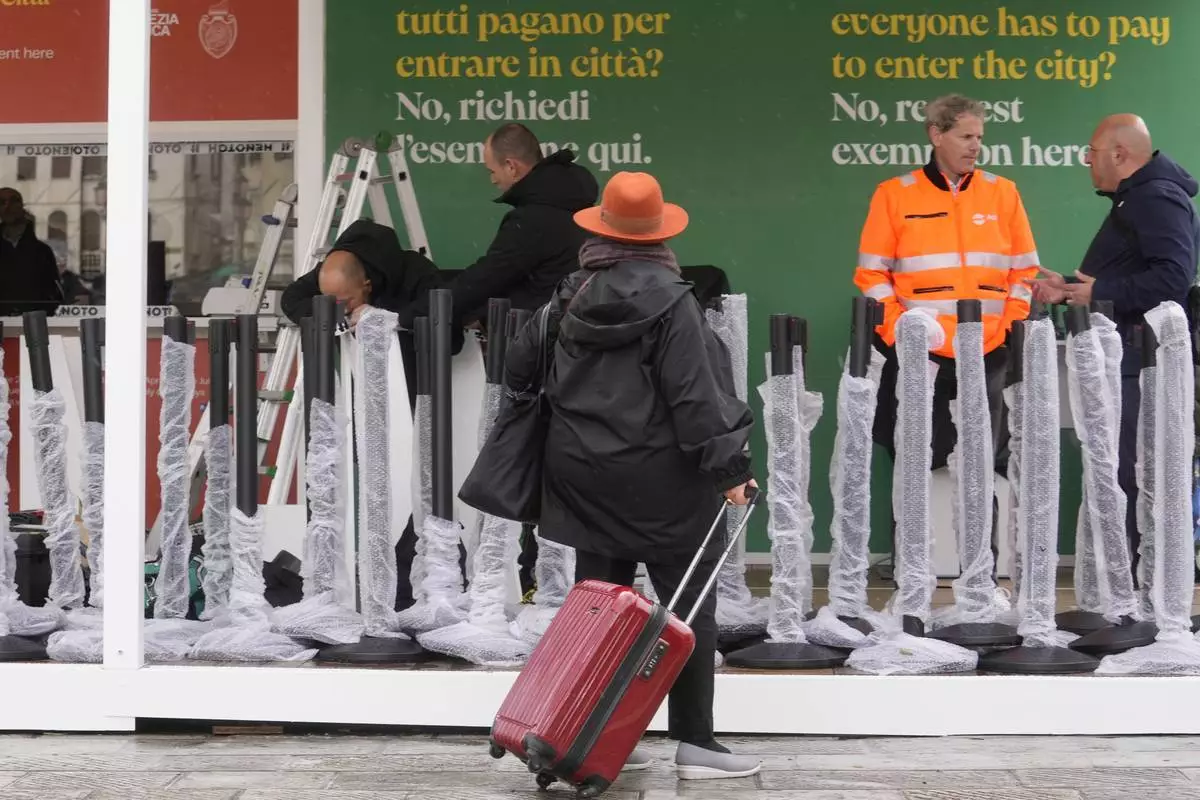
Workers prepare the tourist tax cashier desks outside the main train station in Venice, Italy, Wednesday, April 24, 2024. The lagoon city of Venice begins a pilot program Thursday, April 25, 2024 to charge daytrippers a 5 euro entry fee that authorities hope will discourage tourists from arriving on peak days. Officials expect some 10,000 people will pay the fee to access the city on the first day, downloading a QR code to prove their payment. (AP Photo/Luca Bruno)
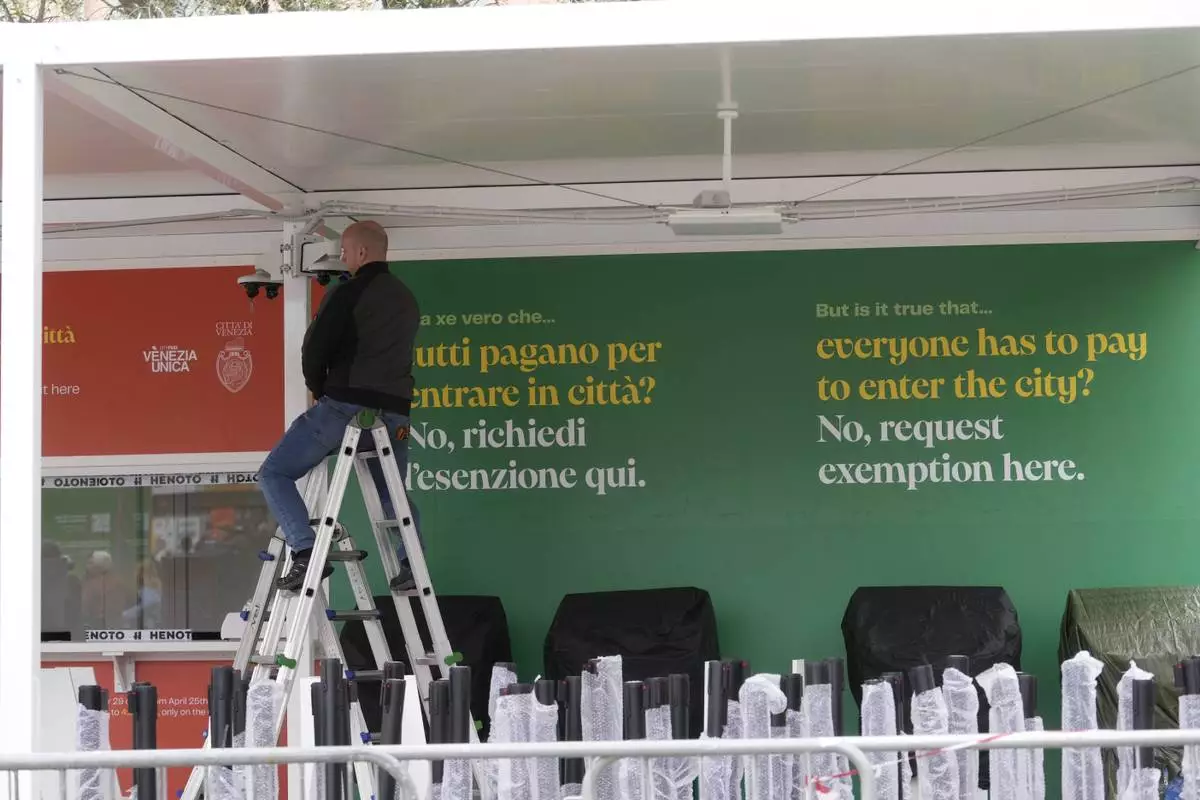
Workers prepare the tourist tax cashier desks outside the main train station in Venice, Italy, Wednesday, April 24, 2024. The lagoon city of Venice begins a pilot program Thursday, April 25, 2024 to charge daytrippers a 5 euro entry fee that authorities hope will discourage tourists from arriving on peak days. Officials expect some 10,000 people will pay the fee to access the city on the first day, downloading a QR code to prove their payment. (AP Photo/Luca Bruno)
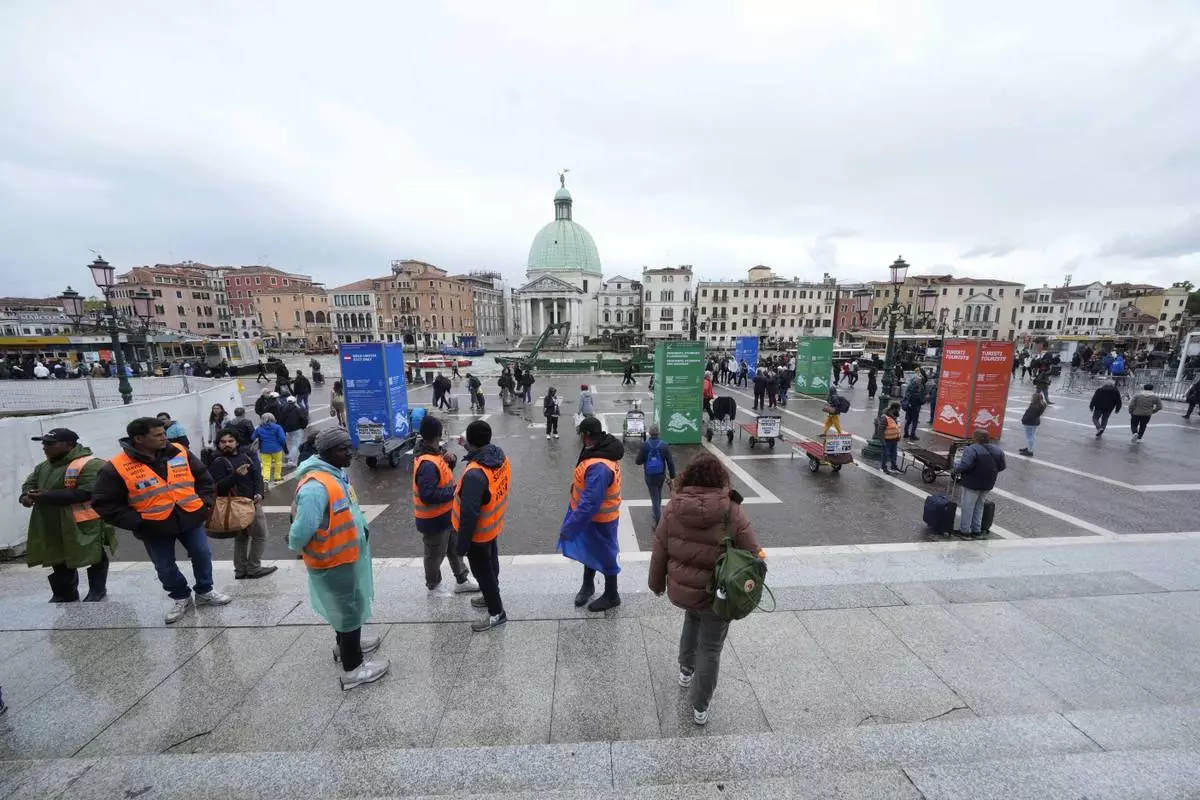
Porters wait for tourists outside the main train station in Venice, Italy, Wednesday, April 24, 2024. The lagoon city of Venice begins a pilot program Thursday, April 25, 2024 to charge daytrippers a 5 euro entry fee that authorities hope will discourage tourists from arriving on peak days. Officials expect some 10,000 people will pay the fee to access the city on the first day, downloading a QR code to prove their payment. (AP Photo/Luca Bruno)
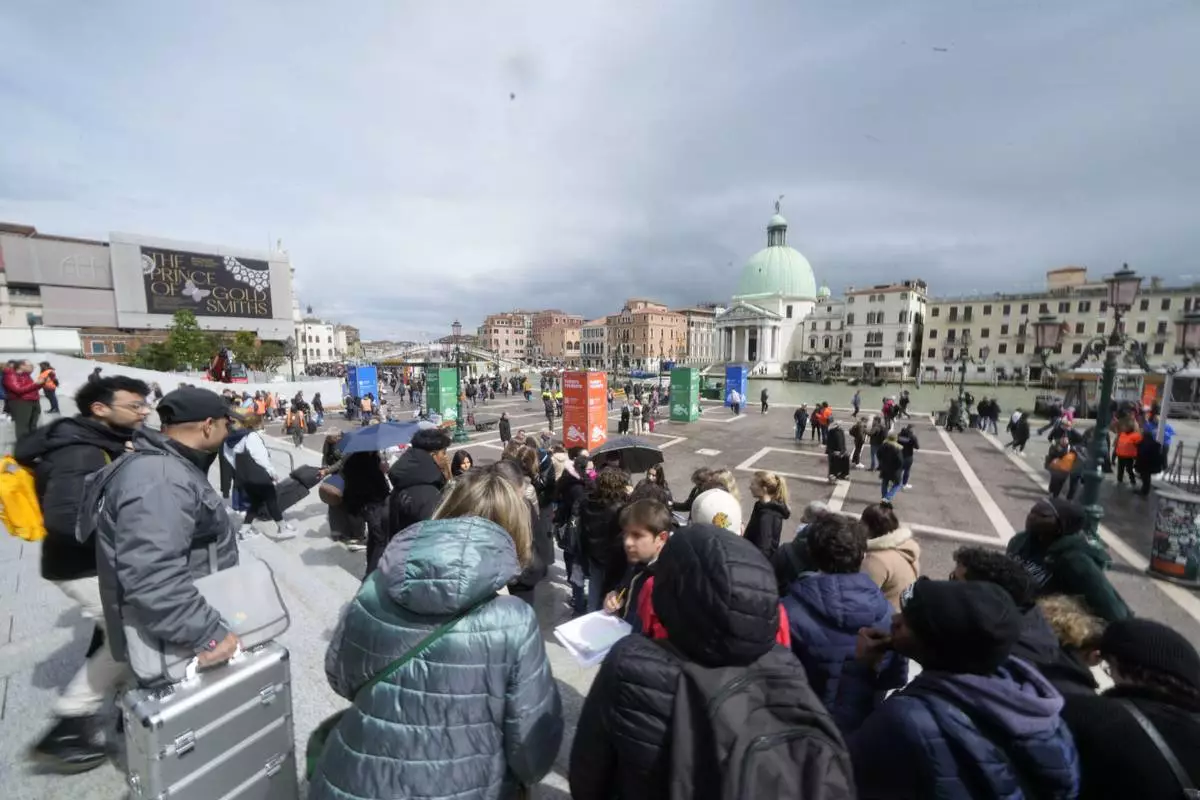
Tourists arrive outside the main train station in Venice, Italy, Wednesday, April 24, 2024. The lagoon city of Venice begins a pilot program Thursday, April 25, 2024 to charge daytrippers a 5 euro entry fee that authorities hope will discourage tourists from arriving on peak days. Officials expect some 10,000 people will pay the fee to access the city on the first day, downloading a QR code to prove their payment. (AP Photo/Luca Bruno)
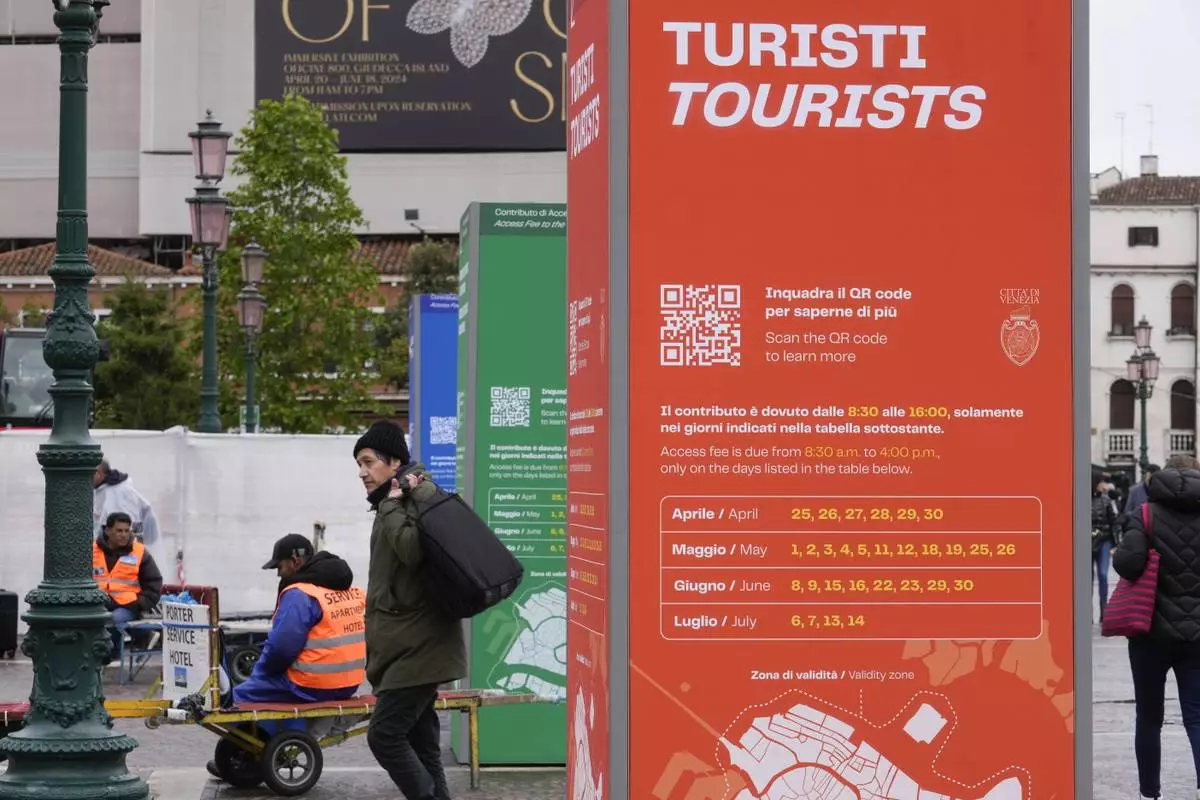
Tourist information boards are seen outside the main train station in Venice, Italy, Wednesday, April 24, 2024. The lagoon city of Venice begins a pilot program Thursday, April 25, 2024 to charge daytrippers a 5 euro entry fee that authorities hope will discourage tourists from arriving on peak days. Officials expect some 10,000 people will pay the fee to access the city on the first day, downloading a QR code to prove their payment. (AP Photo/Luca Bruno)
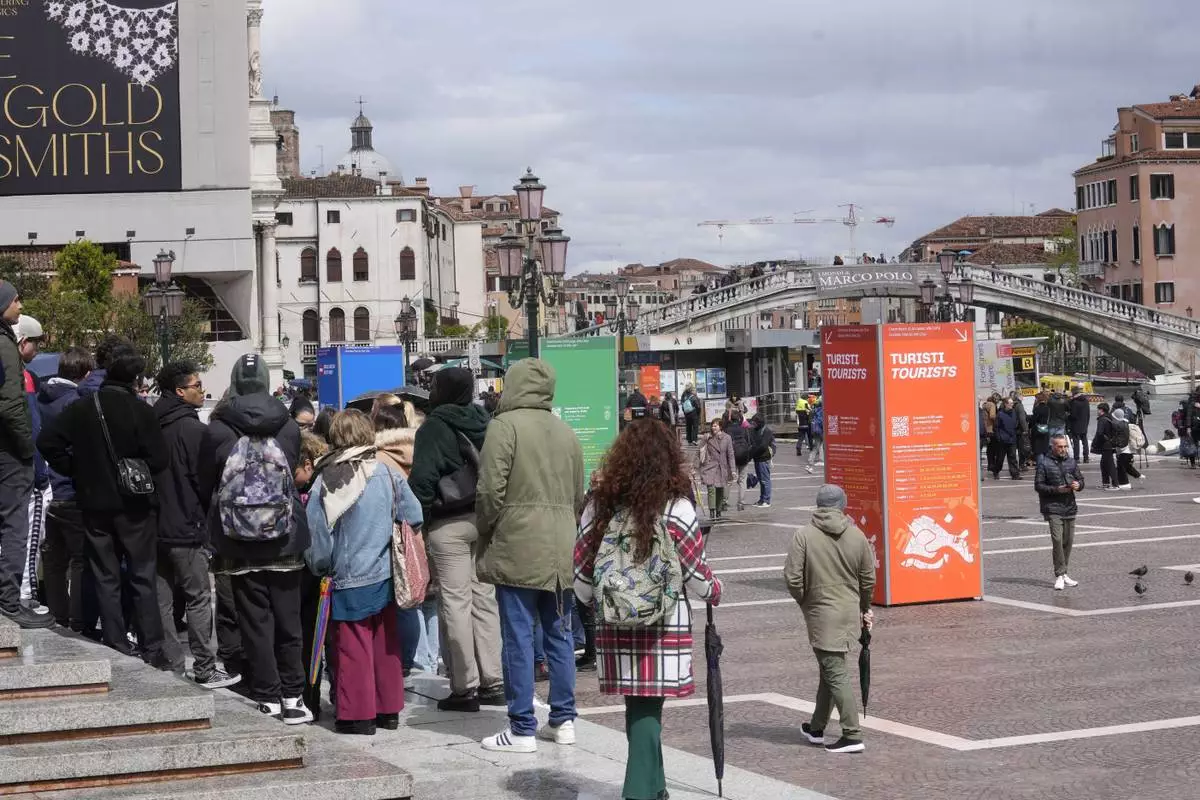
Tourists arrive outside the main train station in Venice, Italy, Wednesday, April 24, 2024. The lagoon city of Venice begins a pilot program Thursday, April 25, 2024 to charge daytrippers a 5 euro entry fee that authorities hope will discourage tourists from arriving on peak days. Officials expect some 10,000 people will pay the fee to access the city on the first day, downloading a QR code to prove their payment. (AP Photo/Luca Bruno)






































